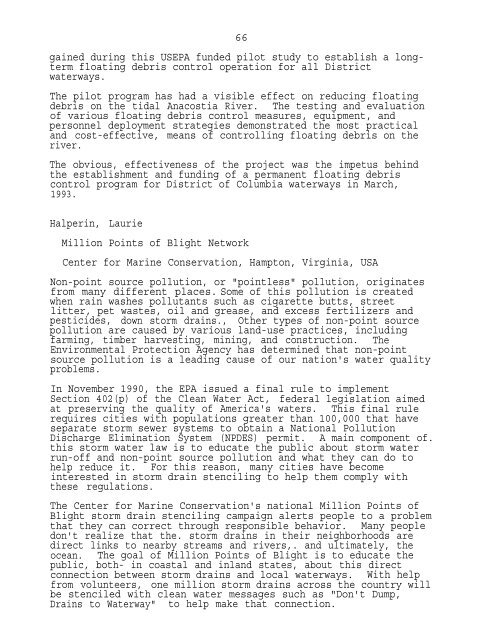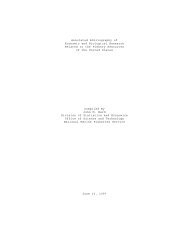Poster abstracts and manuscripts from the Third International ...
Poster abstracts and manuscripts from the Third International ...
Poster abstracts and manuscripts from the Third International ...
Create successful ePaper yourself
Turn your PDF publications into a flip-book with our unique Google optimized e-Paper software.
66<br />
gained during this USEPA funded pilot study to establish a longterm<br />
floating debris control operation for all District<br />
waterways.<br />
The pilot program has had a visible effect on reducing floating<br />
debris on <strong>the</strong> tidal Anacostia River. The testing <strong>and</strong> evaluation<br />
of various floating debris control measures, equipment, <strong>and</strong><br />
personnel deployment strategies demonstrated <strong>the</strong> most practical<br />
<strong>and</strong> cost-effective, means of controlling floating debris on <strong>the</strong><br />
river.<br />
The obvious, effectiveness of <strong>the</strong> project was <strong>the</strong> impetus behind<br />
<strong>the</strong> establishment <strong>and</strong> funding of a permanent floating debris<br />
control program for District of Columbia waterways in March,<br />
1993.<br />
Halperin, Laurie<br />
Million Points of Blight Network<br />
Center for Marine Conservation, Hampton, Virginia, USA<br />
Non-point source pollution, or "pointless" pollution, originates<br />
<strong>from</strong> many different places. Some of this pollution is created<br />
when rain washes pollutants such as cigarette butts, street<br />
litter, pet wastes, oil <strong>and</strong> grease, <strong>and</strong> excess fertilizers <strong>and</strong><br />
pesticides, down storm drains., O<strong>the</strong>r types of non-point source<br />
pollution are caused by various l<strong>and</strong>-use practices, including<br />
farming, timber harvesting, mining, <strong>and</strong> construction. The<br />
Environmental Protection Agency has determined that non-point<br />
source pollution is a leading cause of our nation's water quality<br />
problems.<br />
In November 1990, <strong>the</strong> EPA issued a final rule to implement<br />
Section 402(p) of <strong>the</strong> Clean Water Act, federal legislation aimed<br />
at preserving <strong>the</strong> quality of America's waters. This final rule<br />
requires cities with populations greater than 100,000 that have<br />
separate storm sewer systems to obtain a National Pollution<br />
Discharge Elimination System (NPDES) permit. A main component of.<br />
this storm water law is to educate <strong>the</strong> public about storm water<br />
run-off <strong>and</strong> non-point source pollution <strong>and</strong> what <strong>the</strong>y can do to<br />
help reduce it. For this reason, many cities have become<br />
interested in storm drain stenciling to help <strong>the</strong>m comply with<br />
<strong>the</strong>se regulations.<br />
The Center for Marine Conservation's national Million Points of<br />
Blight storm drain stenciling campaign alerts people to a problem<br />
that <strong>the</strong>y can correct through responsible behavior. Many people<br />
don't realize that <strong>the</strong>. storm drains in <strong>the</strong>ir neighborhoods are<br />
direct links to nearby streams <strong>and</strong> rivers,. <strong>and</strong> ultimately, <strong>the</strong><br />
ocean. The goal of Million Points of Blight is to educate <strong>the</strong><br />
public, both- in coastal <strong>and</strong> inl<strong>and</strong> states, about this direct<br />
connection between storm drains <strong>and</strong> local waterways. With help<br />
<strong>from</strong> volunteers, one million storm drains across <strong>the</strong> country will<br />
be stenciled with clean water messages such as "Don't Dump,<br />
Drains to Waterway" to help make that connection.
















